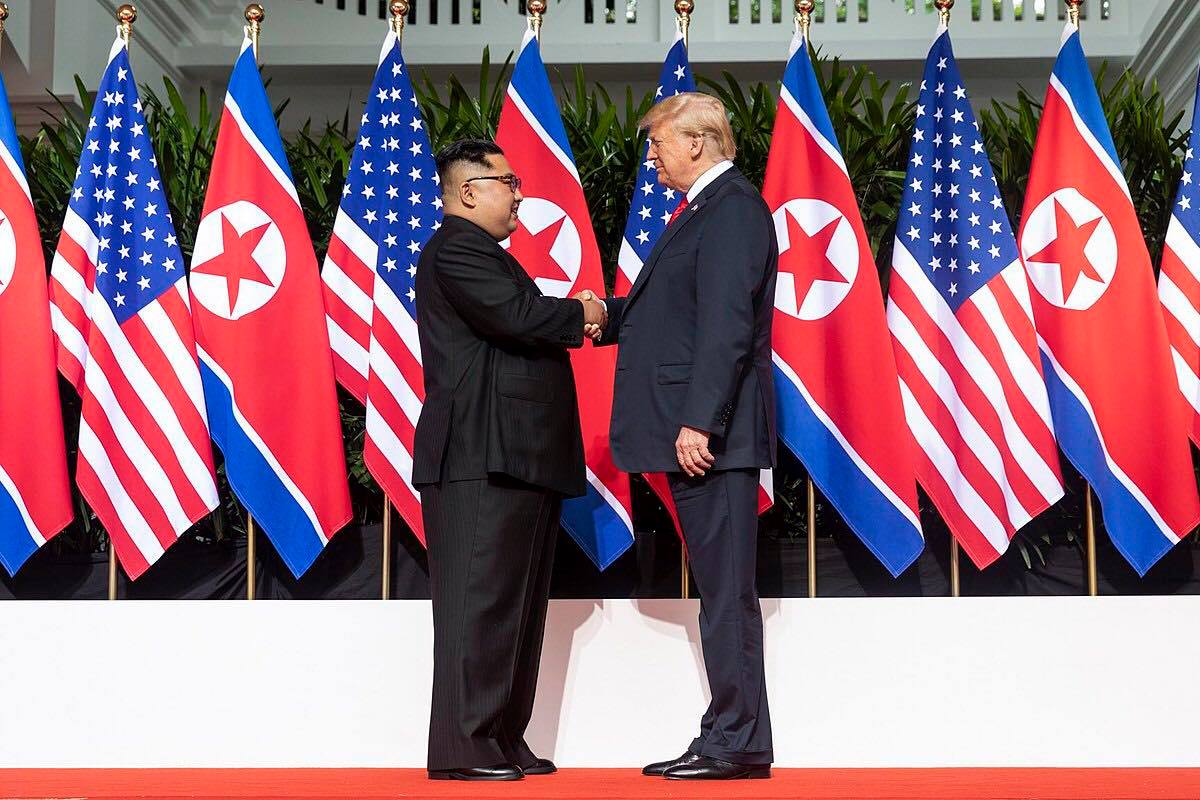
HANOI, Vietnam — President Donald Trump hoped for “great things” from his second meeting with North Korea’s Kim Jong Un as he paid a courtesy call Wednesday on his Vietnamese hosts. Kim was expected to take in some sights before the leaders open their second nuclear summit with private talks and a social dinner.
Anticipation for what will come out of the summit is running high in Hanoi. But the carnival-like atmosphere in the Vietnamese capital, with street artists painting likenesses of the leaders and vendors hawking T-shirts emblazoned with their faces, stands in contrast to the serious items on the agenda: North Korea’s pursuit of nuclear weapons and peace on the Korean Peninsula.
“We have a very big meeting planned tonight as you know, with North Korea, Chairman Kim, and I think it may very well turn out to be very successful,” Trump told the top leaders of Vietnam.
“I look forward to the meeting tonight with Chairman Kim and hopefully it’s going to be successful. We’ll see what happens, but he wants to do something great,” Trump said, adding that Kim could use Vietnam as a model for economic revitalization. “If you look at what you’ve done in a short time, he can do it in a very, very rapid time — make North Korea into a great economic power.”
The president sounded a similar message about Vietnamese prosperity in a tweet before he left his heavily guarded hotel.
“Vietnam is thriving like few places on earth. North Korea would be the same, and very quickly, if it would denuclearize,” Trump tweeted Wednesday, hours before he and Kim were to meet again. “The potential is AWESOME, a great opportunity, like almost none other in history, for my friend Kim Jong Un. We will know fairly soon – Very Interesting!”
Trump said at a separate meeting with Vietnamese officials that “hopefully great things will happen later on with our meeting” with Kim.
Trump and Kim first met last June in Singapore, a summit that was long on historic pageantry but short on any enforceable agreements for North Korea to give up its nuclear arsenal. North Korea has spent decades, at great economic sacrifice, building its nuclear program, and there is widespread skepticism that it will give away that program without getting something substantial from the U.S.
That could be a declaration to end the Korean War. Such an announcement would allow Trump to make history and would dovetail with his opposition to “forever wars.” But it wouldn’t amount to concrete steps toward denuclearization and could even turn the focus of discussions to removing or reducing the 28,500 U.S. troops stationed in South Korea. If there is no war, North Korea could ask why the U.S. needs to have troops in South Korea at all.
The conflict ended in 1953 with an armistice, essentially a cease-fire signed by North Korea, China and the 17-nation, U.S.-led United Nations Command. If made, the declaration would amount to a political statement, ostensibly teeing up talks for a formal peace treaty that would involve other nations.
While Trump wants Kim to agree to dismantle his nuclear sites in a verifiable way, Kim is seeking relief from crushing U.S. sanctions hobbling his economy. Trump has been using Kim’s need for economic revitalization as leverage to get concessions on denuclearization.
Other items being discussed are opening liaison offices in both North Korea and the United States. North and South Korea also want sanctions dialed back so they can resurrect two major symbols of rapprochement that provided much-needed hard currency to North Korea: a jointly run factory park in Kaesong and South Korean tours to the North’s scenic Diamond Mountain resort.
Trump remains eager to claim an attention-grabbing victory at the summit to offset the political turmoil he faces at home.
With the president away from the U.S., his now-disbarred former personal lawyer was testifying publicly on Capitol Hill later Wednesday about alleged misconduct by Trump. The Democratic-led House, with backing from several Republicans, approved legislation aimed at blocking the Republican president from steering billions of dollars to build barriers along the U.S.-Mexico border. A House committee also voted to subpoena administration officials over family separations at the border.
Michael Cohen, once Trump’s loyal attorney and fixer, has turned on his former boss and co-operated with special counsel Robert Mueller, who is looking into whether the Trump’s presidential campaign co-ordinated with Russia and whether the president tried to obstruct the investigation.
The president’s eldest son, Donald Trump Jr., accused Democrats in Congress of scheduling Cohen’s testimony to overshadow the summit.
“After 60 years of failed attempts trying to end the war, trying to end nuclear proliferation on the Korean peninsula, you have finally a president who’s willing to do it,” he told Fox News Channel. “For the Democrats to try to counterprogram that kind of progress — to try to perhaps somehow distract him with this nonsense … it just goes to show you how much those Democrats really disdain Trump but also America.”
The president jabbed at Democrats too, saying in a tweet that they “should stop talking about what I should do with North Korea and ask themselves instead why they didn’t do ‘it’ during eight years of the Obama Administration?”
———
AP journalists Yves Dam Van in Dong Dang, Hyung-jin Kim, Adam Schreck and Hau Dinh in Hanoi, and Kim Tong-hyung in Seoul, South Korea, contributed to this report.